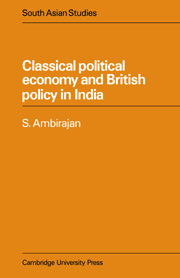Book contents
- Frontmatter
- Contents
- Dedication
- Acknowledgments
- 1 Introduction
- 2 Economic ideas and British policy towards India
- 3 Economic ideas and famine policy
- 4 Economic ideas and economic relations
- 5 Economic ideas and land taxation
- 6 Economic ideas and taxation policies
- 7 Political economy and a policy of economic development
- 8 The state and the policy for economic development
- 9 Conclusion
- Select bibliography
- Index
5 - Economic ideas and land taxation
Published online by Cambridge University Press: 31 March 2010
- Frontmatter
- Contents
- Dedication
- Acknowledgments
- 1 Introduction
- 2 Economic ideas and British policy towards India
- 3 Economic ideas and famine policy
- 4 Economic ideas and economic relations
- 5 Economic ideas and land taxation
- 6 Economic ideas and taxation policies
- 7 Political economy and a policy of economic development
- 8 The state and the policy for economic development
- 9 Conclusion
- Select bibliography
- Index
Summary
The true defence of our system of taxation in India is, not that it is preferable to any other, when judged according to the generally received principles of political economy, nor even that it has been continued because we found it established, but because we consider it to be utterly impracticable to raise the same sum in a less exceptionable way.
The Court of Directors of the Honourable East India CompanyTHE BEGINNINGS OF A LAND POLICY
For its sustenance, the British Raj depended to a large extent on the land, for it was the resources that were secured from the agricultural sector that helped the government to organise the administration, embark on conquests, maintain law and order and make British India the brightest jewel of the Empire.
Such diversion of resources was not easy. On the one hand, funds were needed for the purpose of ruling a vast country like India; and, on the other, it was by no means a light task to build a system of taxation that would be satisfactory in all respects. To be operative the system should not conflict too much with interests that were politically dangerous or potentially troublesome. Nor should it destroy the mainsprings of agricultural enterprise. At the same time, sufficient resources had to be secured with little disturbance. Throughout its history, the policy makers of the British government in India found it convenient, therefore, to resort to the ‘Principles of Political Economy’ for guidance to solve the problems that arose in devising systems of land taxation.
- Type
- Chapter
- Information
- Classical Political Economy and British Policy in India , pp. 144 - 181Publisher: Cambridge University PressPrint publication year: 1978



